Digital interventions for the management of chronic obstructive pulmonary disease
- PMID: 33871065
- PMCID: PMC8094214
- DOI: 10.1002/14651858.CD013246.pub2
Digital interventions for the management of chronic obstructive pulmonary disease
Abstract
Background: Chronic obstructive pulmonary disease (COPD) is associated with dyspnoea, cough or sputum production (or both) and affects quality of life and functional status. More efficient approaches to alternative management that may include patients themselves managing their condition need further exploration in order to reduce the impact on both patients and healthcare services. Digital interventions may potentially impact on health behaviours and encourage patient engagement.
Objectives: To assess benefits and harms of digital interventions for managing COPD and apply Behaviour Change Technique (BCT) taxonomy to describe and explore intervention content.
Search methods: We identified randomised controlled trials (RCTs) from the Cochrane Airways Trials Register (date of last search 28 April 2020). We found other trials at web-based clinical trials registers.
Selection criteria: We included RCTs comparing digital technology interventions with or without routine supported self-management to usual care, or control treatment for self-management. Multi-component interventions (of which one component was digital self-management) compared with usual care, standard care or control treatment were included.
Data collection and analysis: We used standard Cochrane methods. Two review authors independently selected trials for inclusion, extracted data, and assessed risk of bias. Discrepancies were resolved with a third review author. We assessed certainty of the evidence using the GRADE approach. Primary outcomes were impact on health behaviours, self-efficacy, exacerbations and quality of life, including the St George's Respiratory Questionnaire (SGRQ). The minimally important difference (MID) for the SGRQ is 4 points. Two review authors independently applied BCT taxonomy to identify mechanisms in the digital interventions that influence behaviours.
Main results: Fourteen studies were included in the meta-analyses (1518 participants) ranging from 13 to 52 weeks duration. Participants had mild to very severe COPD. Risk of bias was high due to lack of blinding. GRADE ratings were low to very low certainty due to lack of blinding and imprecision. Common BCT clusters identified as behaviour change mechanisms in interventions were goals and planning, feedback and monitoring, social support, shaping knowledge and antecedents. Digital technology intervention with or without routine supported self-management Interventions included mobile phone (three studies), smartphone applications (one study), and web or Internet-based (five studies). Evidence is very uncertain about effects on impact on health behaviours as measured by six-minute walk distance (6MWD) at 13 weeks (mean difference (MD) 26.20, 95% confidence interval (CI) -21.70 to 74.10; participants = 122; studies = 2) or 23 to 26 weeks (MD 14.31, 95% CI -19.41 to 48.03; participants = 164; studies = 3). There may be improvement in 6MWD at 52 weeks (MD 54.33 95% CI -35.47 to 144.12; participants = 204; studies = 2) but studies were varied (very low certainty). There may be no difference in self-efficacy on managing Chronic Disease Scale (SEMCD) or pulmonary rehabilitation adapted index of self-efficacy tool (PRAISE). Evidence is very uncertain. Quality of life may be slightly improved on the chronic respiratory disease questionnaire (CRQ) at 13 weeks (MD 0.45, 95% CI 0.01 to 0.90; participants = 123; studies = 2; low certainty), but is not clinically important (MID 0.5). There may be little or no difference at 23 or 52 weeks (low to very low certainty). There may be a clinical improvement on SGRQ total at 52 weeks (MD -26.57, 95% CI -34.09 to -19.05; participants = 120; studies = 1; low certainty). Evidence for COPD assessment test (CAT) and Clinical COPD Questionnaire (CCQ) is very uncertain. There may be little or no difference in dyspnoea symptoms (CRQ dyspnoea) at 13, 23 weeks or 52 weeks (low to very low certainty evidence) or mean number of exacerbations at 26 weeks (low-certainty evidence). There was no evidence for the number of people experiencing adverse events. Multi-component interventions Digital components included mobile phone (one study), and web or internet-based (four studies). Evidence is very uncertain about effects on impact on health behaviour (6MWD) at 13 weeks (MD 99.60, 95% CI -15.23 to 214.43; participants = 20; studies = 1). No evidence was found for self-efficacy. Four studies reported effects on quality of life (SGRQ and CCQ scales). The evidence is very uncertain. There may be no difference in the number of people experiencing exacerbations or mean days to first exacerbation at 52 weeks with a multi-component intervention compared to standard care. Evidence is very uncertain about effects on the number of people experiencing adverse events at 52 weeks.
Authors' conclusions: There is insufficient evidence to demonstrate a clear benefit or harm of digital technology interventions with or without supported self-management, or multi-component interventions compared to usual care in improving the 6MWD or self-efficacy. We found there may be some short-term improvement in quality of life with digital interventions, but there is no evidence about whether the effect is sustained long term. Dyspnoea symptoms may improve over a longer duration of digital intervention use. The evidence for multi-component interventions is very uncertain and as there is little or no evidence for adverse events, we cannot determine the benefit or harm of these interventions. The evidence base is predominantly of very low certainty with concerns around high risk of bias due to lack of blinding. Given that variation of interventions and blinding is likely to be a concern, future, larger studies are needed taking these limitations in consideration. Future studies are needed to determine whether the small improvements observed in this review can be applied to the general COPD population. A clear understanding of behaviour change through the BCT classification is important to gauge uptake of digital interventions and health outcomes in people with varying severity of COPD. Currently there is no guidance for interpreting BCT components of a digital intervention for changes to health outcomes. We could not interpret the BCT findings to the health outcomes we were investigating due to limited evidence that was of very low certainty. In future research, standardised approaches need to be considered when designing protocols to investigate effectiveness of digital interventions by including a standardised approach to BCT classification in addition to validated behavioural outcome measures that may reflect changes in behaviour.
Copyright © 2021 The Cochrane Collaboration. Published by John Wiley & Sons, Ltd.
Conflict of interest statement
SJ is employed full‐time as a systematic reviewer funded by an NIHR Programme Grant to complete work on this review.
EB: was funded as the Cochrane Airways Group statistician during part of the time she was authoring this review. She is a full‐time PhD student at the University of Michigan and has no conflicts of interests related to the review.
CT was employed part‐time in 2017‐18 by an NIHR Programme Grant to complete work on this Cochrane Review. He is currently a Specialty Registrar in Clinical Pharmacology and Therapeutics and General Internal Medicine.
SP: none known.
JF: None known.
RD: none known.
Figures
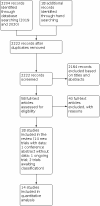
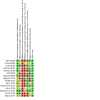

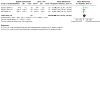

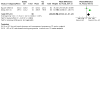


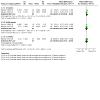


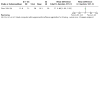
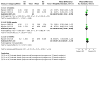


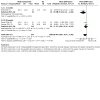





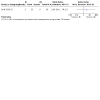
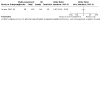
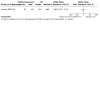


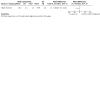

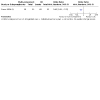

Update of
- doi: 10.1002/14651858.CD013246
References
References to studies included in this review
Boer 2019 {published data only}
-
- Bischoff E, Boer L, Van Der Hiejden, Lucas P, Akkermans R, Vercoulen J, et al. A smart mHealth tool versus a paper action plan to support self-management of COPD exacerbations: a randomised controlled trial. European Respiratory Journal 2019;54:PA2238. [DOI: 10.1183/13993003.congress-2019.PA2238] - DOI - PMC - PubMed
-
- NCT02553096. Exacerbation self-management in COPD: the ACCESS study [Adaptive Computerized COPD Exacerbation Self-management Support (ACCESS): A randomised controlled trial]. clinicaltrials.gov/show/nct02553096 (first received 17 September 2005).
Casas 2006 {published data only}
-
- Casas A, Troosters T, Garcia-Aymerich J, Roca J, Hernandez C, Alonso A, et al. Integrated care prevents hospitalisations for exacerbations in COPD patients. European Respiratory Journal 2006;28:123-30. - PubMed
-
- Garcia-Aymerich J, Hernandez C, Alonso A, Casas A, Rodriguez-Roisin R, Anto JM, et al. Effects of an integrated care intervention on risk factors of COPD readmission. Respiratory Medicine 2007;101:1462-9. - PubMed
Chan 2016 {published data only}
-
- Chan H, Dai Y, Hou I. Evaluation of a tablet-based instruction of breathing technique inpatients with COPD. International Journal of Medical Informatics 2016;94:263-70. - PubMed
Farmer 2017 {published data only}
-
- Farmer A, Toms C, Hardinge M, Williams V, Rutter H, Tarassenko L. Self-management support using an Internet-linked tabled computer (the EDGE platform)-based intervention in chronic obstructive pulmonary disease: protocol for the EDGE-COPD randomised controlled trial. BMJ Open 2014;4(1):e004437. - PMC - PubMed
-
- Farmer A, Williams V, Velardo C, Shah SA, Yu L-M, Rutter H, et al. Self-management support using an Internet-linked tablet computer intervention in chronic obstructive pulmonary disease (EDGE): randomised controlled trial. NPJ Primary Care Respiratory Medicine 2016;26:16022.
-
- ISRCTN40367841. Self management and support programme (EDGE) for COPD. www.isrctn.com/ISRCTN40367841 (first received 17 October 2012).
Kessler 2018 {published data only}
-
- Borbeau J, Kessler R, Casan P, Koehler D, Tognella S, Viejo JL, et al. A tele care programme for self-management of COPD exacerbations and promotion of an active lifestyle. Canadian Journal of Respiratory Critical Care and Sleep Medicine 2017;1(2):98.
-
- Kessler R, Casan-Clara P, Koehler D, Tognella S, Viejo JL, Dal Negro RW, et al. COMET: a multicomponent home-based disease-management programme versus routine care in severe COPD. European Respiratory Journal 2018;51:1701612. - PubMed
Koff 2009 {published data only}
-
- Koff PB, Jones RH, Cashman JM, Vandivier RW. Proactive integrated care improves quality of life in patients with COPD. European Respiratory Journal 2009;33(5):1031-8. - PubMed
Nguyen 2008 {published data only}
-
- Carrieri-Kohlman G. Internet-based and established dyspnoea self-management programmes in chronic obstructive pulmonary (COPD) patients [Comparing the effects of an Internet-based to an established dyspnea self-management program on dyspnea, exercise behavior, and pulmonary exacerbations in patients with COPD]. clinicaltrials.gov/ct2/show/NCT00102401 (first received 31 January 2005).
-
- Nguyen HQ, Cuenco D, Wolpin RS, Reinke LF, Benditt J, Carrieri-Kohlman V. A randomised trial of an Internet based versus a face to face dyspnoea self management program in patients with COPD. In: American Thoracic Society International Conference; 2008 May 16-21; Toronto. Toronto, 2008:A509.
-
- Nguyen HQ, Donesky-Cuenco D, Wolpin S, Reinke LF, Benditt JO, Paul SM, et al. Randomized controlled trial of an internet-based versus face-to-face dyspnea self-management program for patients with chronic obstructive pulmonary disease: pilot study. Journal of Medical Internet Research 2008;10(2):e9. - PMC - PubMed
Nguyen 2013 {published data only}
-
- Donesky DM, Nguyen HQ, Benditt J, Carrieri-Kohlman V. Effects of a dyspnoea self-management program on hospitalizations and urgent care in COPD. American Journal of Respiratory and Critical Care Medicine 2012;185:A4866.
-
- NCT00461162. Dyspnea self-management: internet or face-to-face. clinicaltrials.gov/show/nct00461162 (first received 17 April 2007).
-
- Nguyen HQ, Donesky-Cuenco D, Wolpin S, Benditt JO, Paul S, Carrieri-Kohlman V. Randomized controlled trial of an Internet-based dyspnoea self-management programme in patients with COPD. American Journal of Respiratory and Critical Care Medicine 2011;183:A5818.
-
- Nguyen HQ, Donesky DM, Benditt J, Carrieri-Kohlman V. Moderators of improvement in self-efficacy for managing dyspnoea in patients with COPD participating in a dyspnoea self-management programme. American Journal of Critical Care Medicine 2012;185:A4867.
Nield 2012 {published data only}
-
- NCT01161290. Real-time telehealth to promote self-care management for chronic obstructive pulmonary disease (E-Breathe) [A randomized controlled trial using real-time interactive audio/visual telehealth to promote self-care management for United States veterans with chronic obstructive pulmonary disease: a pilot study]. clinicaltrials.gov/show/nct01161290 (first received 13 July 2010).
-
- Nield M, Soo Hoo GW. Real-time telehealth for COPD self-management using Skype™. Journal of Chronic Obstructive Pulmonary Disease 2012;9(6):611-9. - PubMed
Park 2020 {published data only}
-
- Park SK, Bang CH, Lee SH. Evaluating the effect of a smartphone app-based self-management program for people with COPD: A randomized controlled trial. Applied Nursing Research 2020;52:151231. - PubMed
Poureslami 2016 {published data only}
-
- Poureslami I, Kwan S, Lam S, Khan NA, FitzGerald JM. Assessing the effect of culturally specific audiovisual educational interventions on attaining self-management skills for chronic obstructive pulmonary disease in Mandarin- and Cantonese-speaking patients: a randomised controlled trial. International Journal of Chronic Obstructive Pulmonary Disease 2016;11:1811-22. - PMC - PubMed
Sano 2016 {published data only}
-
- Sano E, Ueki J, Sasaki S, Kuriyama S, Muraki K, Nagashima O, et al. Self-management education using interactive application software for tablet computer to improve health status in patients with COPD: A randomized controlled trial. European Respiratory Journal 2016;48:PA3736.
Stamenova 2020 {published data only}
-
- NCT03741855. Evaluating the cloud DX platform as a tool for self-management and asynchronous remote-monitoring of COPD. clinicaltrials.gov/show/nct03741855 (first received 15 November 2018).
Tabak 2014 {published data only}
-
- Tabak M, Brusse-Keizer M, Ommeren C, Kotte H, Weltevreden P, Hermens HJ, et al. A telehealth programme for self-management of COPD exacerbations and promotion of an active lifestyle. European Respiratory Journal 2013;42:P2911.
Wang 2017 {published data only}
References to studies excluded from this review
Akrom 2015 {published data only}
-
- Akrom A, Nurwijayanti A. Brief counselling and mobile phone short message service (SMS) increase patient compliance. International Journal of Pharma Medicine and Biological Sciences 2015;4(3):175-9.
Cameron‐Tucker 2016 {published data only}
-
- Cameron-Tucker HL, Joseph L, Edwards B, Wood-Baker R. Telephone health-mentoring, a walking action plan and rehabilitation. Respirology 2011;16:33-4.
Demeyer 2017 {published data only}
-
- Demeyer H, Louvaris Z, Frei A, Rabinovich RA, Jong C, Gimeno-Santos E, et al. Physical activity is increased by a 12-week semi-automated tele coaching programme in patients with COPD: a multi centre randomised controlled trial. Thorax 2017;72(5):415-23. [DOI: 10.1136/thoraxjnl-2016-209026] - DOI - PMC - PubMed
-
- Demeyer H, Louvaris Z, Tanner R, Rubio N, Frei A, Jong C, et al. Increasing physical activity in patients with COPD using a tele coaching programme: A multicenter RCT. European Respiratory Journal 2015;46:OA278.
-
- NCT02158065. Impact of "tele-coaching programme" on physical activity in patients with COPD (MrPAPP) [A 3-month multicenter randomized trial to evaluate the efficacy of a physical activity promotion program on the experience of physical activity in patients with COPD (Mr PAPP)]. clinicaltrials.gov/ct2/show/nct02158065 (first received 6 June 2014).
DRKS00017275 {published data only}
-
- DRKS00017275. Impact of a smart phone application (KAIA COPD-App) in combination with Activity Monitoring as maintenance program following pulmonary rehabilitation in COPD: an international multi-centred randomised controlled trial. www.drks.de/drks_web/navigate.do?navigationId=trial.HTML&TRIAL_ID=DR... (first received 27 June 2019).
Houchen‐Wolloff 2018 {published data only}
-
- Houchen-Wolloff L, Orme M, Clinch L, Gardiner N, Singh S. Feasibility of a web-based self-management programme, as a ‘bridge’ to starting pulmonary rehabilitation, for individuals hospitalised with an acute exacerbation of chronic obstructive pulmonary disease (AECOPD). Thorax 2018;73(Supplement 4):A8-9. [DOI: 10.1136/thorax-2018-212555.17] - DOI
-
- ISRCTN13081008. InterSPACE: feasibility of an integrated telehealth and self-management programme for individuals hospitalised with an exacerbation of COPD. www.isrctn.com/ISRCTN13081008 (first received 17 November 2014).
Ito 2017 {published data only}
-
- Ito R, Gon Y, Kogawa N, Hashimoto S. Utility of electronic tablet-based inhaler technique training. European Respiratory Journal 2017;50:OA3196.
Jerant 2008 {published data only}
-
- Jerant A, Moore M, Lorig K, Franks P. Perceived control moderated the self-efficacy-enhancing effects of a chronic illness self-management intervention. Chronic Illness 2008;4(3):173-82. - PubMed
Jordan 2015 {published data only}
-
- Jordan RE, Majothi S, Heneghan NR, Blissett DB, Riley RD, Sitch AJ, et al. Supported self-management for patients with moderate to severe chronic obstructive pulmonary disease (COPD): an evidence synthesis and economic analysis. Health Technology Assessment 2015;19(36):1-515. [DOI: 10.3310/hta19360] - DOI - PMC - PubMed
Kennedy 2013 {published data only}
-
- ISRCTN90940049. Evaluation of the WISE approach in primary care: improving outcomes in chronic conditions through effective self-management [Evaluation of the WISE approach in primary care: improving outcomes in chronic conditions through effective self-management - a two-arm practice-level cluster randomised controlled trial]. www.isrctn.com/ISRCTN90940049 (first received 20 May 2005).
Koff 2020 {unpublished data only}
-
- Koff PB, Min S-J, Diaz DL, Freitag TJ, James SS, Voelkel NF, et al. Impact of proactive integrated care on chronic obstructive pulmonary disease. www.medrxiv.org/content/10.1101/2020.05.19.20107110v1.full.pdf+html (access prior to 7 December 2020). [DOI: 10.1101/2020.05.19.20107110] - DOI - PMC - PubMed
-
- NCT01044927. Advanced eHealth for chronic obstructive pulmonary disease (COPD) in Colorado [Phase 3 clinical trial studying the efficacy of a proactive integrated approach to care in patients with advanced COPD]. clinicaltrials.gov/ct2/show/nct01044927 (first received 8 January 2010).
Kwon 2018 {published data only}
-
- NCT03432117. Evaluate efficacy of respiratory rehabilitation personalised mobile services for respiratory diseases. clinicaltrials.gov/ct2/show/NCT03432117 (first received 14 February 2018).
Lorig 2006 {published data only}
-
- Lorig KR, Ritter PL, Laurent DD, Plant K. Internet-based chronic disease self-management: a randomised trial. Medical Care 2006;44(11):964-71. - PubMed
Martinez 2015 {published data only}
-
- Martinez CH, Moy ML, Nguyen HQ, Cohen M, Kadri R, Roman P, et al. Taking healthy steps: rationale, design and baseline characteristics of a randomised trial of a pedometer-based Internet-mediated walking programme in veterans with chronic obstructive pulmonary disease. BMC Pulmonary Medicine 2015;14:12. [DOI: 10.1186/1471-2466-14-12] - DOI - PMC - PubMed
-
- NCT01102777. Stepping up to health-for veterans with chronic obstructive pulmonary disease (COPD). clinicaltrials.gov/ct2/show/nct01102777 (first received 13 April 2010).
Mitchell‐Wagg 2012 {published data only}
-
- ISRCTN17942821. A self-management programme of activity coping and education-SPACE for COPD-in primary care: a pragmatic trial [A self-management programme of activity coping and education - SPACE FOR COPD - in primary care: a prospective, pragmatic, single-centre, single-blinded randomised controlled trial]. www.isrctn.com/ISRCTN17942821?q=&filters=conditionCategory:Respiratory (first received 17 November 2014).
-
- Mitchell-Wagg K, Warrington V, Apps L, Sewell L, Bankart J, Steiner M, et al. A self-management programme of activity coping and education (SPACE) for COPD: results from a randomised controlled trial. European Respiratory Journal 2012;40:3902.
-
- Mitchell-Wagg K, Warrington V, Apps L, Sewell L, Bankart J, Steiner M, et al. A self-management programme of activity coping and education (SPACE) for COPD: results from a randomised controlled trial. Thorax 2012;67:A25.
NCT01217710 {published data only}
-
- NCT01217710. Promoting physical activity in chronic obstructive pulmonary disease (COPD) through new technology and health coaching [Next generation technology for chronic care self management]. clinicaltrials.gov/ct2/show/nct01217710 (first received 8 October 2010).
NCT02568514 {published data only}
-
- NCT02568514. Study of the effect on clinical outcomes using secure text messaging. www.clinicaltrials.gov/ct2/show/NCT02568514 (first received 6 October 2015).
NCT02632552 {unpublished data only}
-
- NCT02632552. A technology assisted care transition intervention for veterans with CHF or COPD (TACT) [A technology-assisted care transition intervention for veterans with chronic heart failure or chronic obstructive pulmonary disease]. clinicaltrials.gov/show/NCT02632552 (first received 16 December 2015).
NCT02832739 {published data only}
-
- NCT02832739. Exploring acceptance and outcomes of an online-based self-management support system in chronic illness (USECARE) [Exploring acceptance and outcomes of an ICT-based self-management support System for community-dwelling older adults with chronic diseases and informal caregivers: USECARE study protocol]. clinicaltrials.gov/ct2/show/NCT02832739 (first received 15 July 2016).
NCT03131622 {published data only}
-
- NCT03131622. Impact of Ibis on patients with advanced COPD [Impact of Ibis, a digital health solution for patient activation and early intervention, on acute care utilization by patients with advanced COPD]. clinicaltrials.gov/show/nct03131622 (first received 27 April 2017).
NCT03379233 {published data only}
-
- NCT03379233. A randomised study to evaluate the effect of reminder notifications and motivational/adaptive messaging on treatment adherence advice (ADVICE) [A 24-week randomized, controlled, multicenter, open-label study to evaluate the effect of reminder notifications and motivational/adaptive messaging on treatment adherence of COPD subjects receiving Ultibro® Breezhaler® treatment using the Concept2 inhaler for dose administration and tracking]. clinicaltrials.gov/ct2/show/nct03379233 (first received 20 Dec 2017).
NCT03387735 {published data only}
-
- NCT03387735. Multiple chronic conditions for older adults [Heart-related multiple chronic conditions in primary care: behavioral technology]. clinicaltrials.gov/show/nct03387735 (first received 2 January 2018).
NCT03446768 {unpublished data only}
-
- NCT03446768. Monitoring and peer support to improve treatment adherence and outcomes (O2VERLAP) [Monitoring and peer support to improve treatment adherence and outcomes in patients with Overlap Chronic Obstructive Pulmonary Disease and Sleep Apnea via a large PCORnet collaboration]. clinicaltrials.gov/show/nct03446768 (first received 27 February 2018).
NCT03601403 {published data only}
-
- NCT03601403. Tablet-assisted training in exacerbated COPD [Tablet-assisted training as a complement hospital intervention in patients with acute exacerbations of COPD]. clinicaltrials.gov/show/nct03601403 (first received 26 July 2018).
NCT04108143 {published data only}
-
- NCT04108143. Use of MonitorMe in COPD [Use of MonitorMe in COPD: a mixed-methods feasibility study]. https://clinicaltrials.gov/ct2/show/NCT04108143 (first received 27 September 2019).
NCT04196699 {published data only}
-
- NCT04196699. Evaluating the feasibility, acceptability and pre testing the impact of a self-management and tele monitoring program for COPD patients in Lebanon [Evaluating the feasibility, acceptability and pre testing the impact of a self-management and tele monitoring program for COPD patients in Lebanon: protocol for a feasibility study]. clinicaltrials.gov/ct2/show/NCT04196699 (first received 12 December 2019).
NCT04299165 {published data only}
-
- NCT04299165. Smartphone-app as maintenance program in COPD (AMOPUR) [Impact of a smartphone application (KAIA COPD-App) in combination with activity monitoring as maintenance program following pulmonary rehabilitation in COPD: an international multi-centered randomized controlled trial]. clinicaltrials.gov/ct2/show/NCT04299165 (first received 6 March2020). - PMC - PubMed
NL3827 (NTR4009) {published data only}
-
- NL3827 (NTR4009). Pulmonary rehabilitation of COPD: a trial of sustained Internet based self-management support. www.trialregister.nl/trial/3827 (first received 27 May 2013).
North 2020 {published data only}
-
- NCT02706600. Trial of E-health platform supported care vs usual care after exacerbation of COPD (RESCUE) [RESCUE-COPD 1 randomised trial of E-health platform supported care vs usual care after exacerbation of COPD]. clinicaltrials.gov/show/nct02706600 (first received 11 March 2016).
-
- North M, Bourne S, Green B, Chauhan A, Brown T, Winter J, et al. P238 A randomised controlled feasibility trial of an E-health platform supported care vs usual care after exacerbation of COPD. (RESCUE COPD). Thorax 2018;73:A231.
Nyberg 2017 {published data only}
-
- NCT02696187. Feasibility and effects of KOL-webben in patients with COPD [Feasibility and effects of KOL-webben - an internet based health promotion tool directed towards people with chronic obstructive pulmonary disease and staff in the primary health care in Sweden]. clinicaltrials.gov/ct2/show/NCT02696187 (first received 2 March 2016).
-
- Nyberg A, Tistad M, Wadell K. Effects of an Internet based tool for self-management in patients with COPD--a controlled pragmatic pilot trial. European Respiratory Journal 2017;50:OA515.
Redfern 2019 {published data only}
Reguera 2017 {published data only}
-
- Reguera BJ, Bai EM, Martin ML, Monteagudo LJ, Gutierrez NG, Casamitjana JV, et al. Efficacy of an integrated Internet community program after pulmonary rehabilitation for COPD patients: a pilot randomised control trial. European Respiratory Journal 2017;50:OA514.
Ritchie 2016 {published data only}
-
- NCT01135381. IVR-enhanced care transition support for complex patients [E-coaching: IVR-enhanced care transition support for complex patients]. clinicaltrials.gov/ct2/show/NCT01135381 (first received 2 June 2010).
Rixon 2017 {published data only}
-
- ISRCTN43002091. A comprehensive evaluation of the implementation and impact of telecare and telehealth across health and social care - the Whole System Demonstrator (WSD) project. http://www.isrctn.com/ISRCTN43002091 (first received 28 May 2010).
-
- Rixon L, Hirani SP, Cartwright M, Beynon M, Doll H, Stevention A, et al. A RCT of telehealth for COPD patient's quality of life: the whole system demonstrator evaluation. Clinical Respiratory Journal 2017;11(4):459-69. - PubMed
Sink 2020 {published data only}
-
- NCT03002311. Improving follow-up for discharged emergency care patients [Improving medical care with electronic interventions based on automated text and phone messages]. clinicaltrials.gov/ct2/show/NCT03002311 (first received 23 December 2016).
-
- Sink E, Patel K, Groenendyk J, Peters R, Som A, Kim E, et al. Effectiveness of a novel, automated telephone intervention on time to hospitalisation in patients with COPD: a randomised controlled trial. Journal of Telemedicine and Telecare 2020;26(3):132-9. - PubMed
Stenlund 2019 {published data only}
-
- NCT03746873. Increase level of physical activity and decrease of health care for people with COPD [A web-based self-management intervention to increase level of physical activity and decrease use of health care for people with COPD, in primary care: a protocol for a randomized controlled clinical trial]. clinicaltrials.gov/ct2/show/NCT03746873 (first received 20 November 2018).
van der Weegan 2015 {published data only}
-
- NCT01867970. Interactive tool to support self-management through lifestyle feedback, aimed at physical activity of COPD/DM patients (RCTIt'sLiFe!) [RCT It's LiFe! to evaluate the effectiveness of the monitoring and feedback tool and the corresponding counseling protocol (self-management support program) to be executed by practice nurses in primary care]. clinicaltrials.gov/ct2/show/NCT01867970 (first received 4 June 2013).
-
- Weegan S, Verwey R, Spreeuwenberg M, Tange H, Weijden T, Witte L. It's LiFe! Mobile and web-based monitoring and feedback tool embedded in primary care increases physical activity: a cluster randomised controlled trial. Journal of Medical Internet Research 2015;17(7):e184. [DOI: 10.2196/jmir.4579] - DOI - PMC - PubMed
-
- Verway R, Weegan S, Spreeuwenberg M, Tange H, Weijden T, Witte L. A monitoring and feedback tool embedded in a counselling protocol to increase physical activity of patients with COPD or type 2 diabetes in primary care: study protocol of a three-arm cluster randomised controlled trial. BMC Family Practice 2014;15:93. [DOI: 10.1186/1471-2296-15-93] - DOI - PMC - PubMed
Voncken‐Brewster 2015 {published data only}
-
- Trial NL3268 (NTR3421). The effect of a computer-tailored feedback program on smoking behavior and physical activity of people at risk for or with Chronic Obstructive Pulmonary Disease. www.trialregister.nl/trial/3268 (first received 21 May 2012).
-
- Voncken-Brewster V, Tange H, Vries H, Nagykaldi Z, Winken B, Weijden T. A randomised controlled trial evaluating the effectiveness of a web-based, computer-tailored self-management intervention for people with or at risk for COPD. International Journal of Chronic Obstructive Pulmonary Disease 2015;10:1061-73. - PMC - PubMed
-
- Voncken-Brewster V, Tange H, Vries H, Nagykaldi Z, Winkens B, Weijden T. A randomised controlled trial testing a web-based, computer-tailored self-management intervention for people with or at risk for chronic obstructive pulmonary disease: a study protocol. BMC Public Health 2013;13:557. - PMC - PubMed
Wan 2017 {published data only}
-
- Wan ES, Kantorowski A, Teylan M, Kadri R, Richardson CR, Garshick E, et al. Patterns of change in daily step count among COPD patients enrolled in A 3-month physical activity intervention. American Journal of Respiratory and Critical Care Medicine 2017;195:A4939.
Windisch 2018 {published data only}
Zhang 2013 {published data only}
-
- Bai C-X. Management of chronic obstructive airway diseases with e-health. Respirology 2016;21:OA514.
-
- Zhang J, Song Y-L, Bai C-X. MIOTIC study: a prospective, multicenter, randomised study to evaluate the long-term efficacy of mobile phone-based Internet of Things in the management of patients with stable COPD. International Journal of Chronic Obstructive Pulmonary Disease 2013;8:433-8. - PMC - PubMed
References to studies awaiting assessment
NCT00752531 {unpublished data only}
-
- NCT00752531. Effectiveness of home automated tele management in chronic obstructive pulmonary disorder [Evaluation of home automated telemanagement in COPD]. clinicaltrials.gov/show/NCT00752531 (first received 15 September 2008).
NCT03620630 {unpublished data only}
-
- NCT03620630. Clinical efficacy and cost effectiveness of MyCOPD in patients with mild and moderate newly diagnosed COPD [Evidence generation for the clinical efficacy and cost effectiveness of my COPD in patients with mild and moderate newly diagnosed COPD]. clinicaltrials.gov/show/nct03620630 (first received 8 August 2018).
References to ongoing studies
Ding 2019 {published data only}
Additional references
Agusti 2010
Barnett 2012
-
- Barnett K, Mercer SW, Norbury M. Epidemiology of multimorbidity and implications for health care, research, and medical education: a cross-sectional study. Lancet 2012;380:37-43. - PubMed
Benziger 2016
-
- Benziger CP, Roth GA, Moran AE. The global burden of disease study and the preventable burden of NCD. Global Heart 2016;11(4):393-7. - PubMed
Bodini 2019
-
- Bodini R, Grinovero M, Corsico A, Marvisi M, Recchia GG, D'Antonio S, et al. Digital Therapy in the treatment of asthma and COPD - Epidemiology of development and use of an emerging health technology in Respiratory Medicine. European Respiratory Journal 2019;54(63):PA735.
Bucknall 2012
Burge 2020
Centre for Connected Health Policy 2018
-
- Centre for Connected Health Policy (CCHP). Telehealth resource centres, a framework for defining telehealth. cchpca.org/sites/default/files/uploader/Telehealth%20Definintion%20Frame... cchpca.org/what-is-telehealth (accessed 24 June 2018).
COPD Foundation 2018
-
- COPD Foundation. What is COPD? www.copdfoundation.org/What-is-COPD/Understanding-COPD/What-is-COPD.aspx (accessed 27 September 2018).
Cox 2018
Donaldson 2005
-
- Donaldson GC, Wilkinson TM, Hurst JR, Perera WR, Wedzicha JA. Exacerbations and time spent outdoors in chronic obstructive pulmonary disease. American Journal of Respiratory and Critical Care Medicine 2005;171(5):446-52. - PubMed
Fairbrother 2013
-
- Fairbrother P, Pinnock H, Hanley J, McCloughan L, Sheikh A, Pagliari C, et al. Exploring telemonitoring and self-management by patients with chronic obstructive pulmonary disease: a qualitative study embedded in a randomized controlled trial. Patient Education and Counseling 2013;93(3):403-10. - PubMed
Fergie 2019
Folstein 1975
-
- Folstein MF, Folstein SE, McHugh PR. A practical method for grading the cognitive state of patients for the clinician. Journal of Psychiatric Research 1975;12(3):189-98. - PubMed
Forum of International Respiratory Societies 2017
-
- Forum of International Respiratory Societies. The global impact of respiratory disease. Second edition. Sheffield, UK: European Respiratory Society, 2017. [9781849840873] [9781849840880]
Freund 2013
-
- Freund T, Gensichen J, Goetz K, Szecsenyi J, Mahler C. Evaluating self-efficacy for managing chronic disease: psychometric properties of the six-item Self-Efficacy Scale in Germany. Journal of Evaluation in Clinical Practice 2013;19:39-43. - PubMed
Global Burden of Disease 2017
-
- Chronic Respiratory Disease Collaborators. Global, regional, and national deaths, prevalence, disability-adjusted life years, and years lived with disability for chronic obstructive pulmonary disease and asthma, 1990-2015: a systematic analysis for the global burden of disease study 2015. Lancet Respiratory Medicine 2017;5:691-706. - PMC - PubMed
GOLD 2020
-
- Global Initiative for Chronic Obstructive Lung Disease. GOLD Global strategy for the diagnosis, management, and prevention of COPD. goldcopd.org/wp-content/uploads/2019/11/GOLD-2020-REPORT-ver1.0wms.pdf (accessed prior to 8 December 2020)).
GRADEpro GDT [Computer program]
-
- GRADEpro GDT. Version accessed prior to 5 July 2018. Hamilton (ON): McMaster University (developed by Evidence Prime), 2015. Available at gradepro.org.
Hanlon 2017
-
- Hanlon P, Daines L, Campbell C, McKinstry B, Weller D, Pinnock H. Telehealth interventions to support self-management of long-term conditions:a systematic metareview of diabetes, heart failure, asthma, chronic obstructive pulmonary disease, and cancer. Journal of Medical Internet Research 2017;19(5):e172. - PMC - PubMed
Higgins 2011
-
- Higgins JP, Green S (editors). Cochrane Handbook for Systematic Reviews of Interventions Version 5.1.0 (updated March 2011). The Cochrane Collaboration, 2011. Available from www.cochrane-handbook.org.
Higgins 2019
Janjua 2018
Jolly 2018
Jones 1992
-
- Jones PW, Quirk FH, Baveystock CM, Littlejohns P. A self-complete measure of health status for chronic airflow limitation. The St. George's Respiratory Questionnaire. American Review of Respiratory Disease 1992;145(6):1321-7. - PubMed
Jones 2009
-
- Jones PW, Harding G, Berry P, Wiklund I, Chen WH, Leidy NK. Development and first validation of the COPD assessment test. European Respiratory Journal 2009;34:648-54. - PubMed
Jonsdottir 2013
-
- Jonsdottir H. Self-management programmes for people living with chronic obstructive pulmonary disease: a call for reconceptualisation. Journal of Clinical Nursing 2013;22(5-6):621-37. [DOI: ] - PubMed
Kebede 2017
-
- Kebede MM, Liedtke TP, Möllers T, Pischke CR. Characterising active ingredients of eHealth interventions targeting persons with poorly controlled type 2 diabetes mellitus using behaviour change techniques taxonomy: scoping review. Journal of Medical Internet Research 2017;19(10):e348. - PMC - PubMed
Kessler 2011
-
- Kessler R, Partridge MR, Miravitlles M, Cazzola M, Vogelmeier C, Leynaud D, et al. Symptom variability in patients with severe COPD: a pan-European cross-sectional study. European Respiratory Journal 2011;37(2):264-72. - PubMed
Lenferink 2017
-
- Lenferink A, Brusse-Keizer M, Valk PD, Frith PA, Monninkhof EM, Palen J, et al. Self-management interventions including action plans for exacerbations versus usual care in patients with chronic obstructive pulmonary disease. Cochrane Database of Systematic Reviews 2017, Issue 8. Art. No: CD011682. [DOI: 10.1002/14651858.CD011682.pub2] - DOI - PMC - PubMed
Liacos 2019
-
- Liacos A, McDonald CF, Mahal A, Lahham A, Giles R, Holland AE. The Pulmonary Rehabilitation Adapted Index of Self-Efficacy (PRAISE) tool predicts reduction in sedentary time following pulmonary rehabilitation in people with chronic obstructive pulmonary disease (COPD). Physiotherapy 2019;105(1):90-7. - PubMed
López‐Campos 2016
-
- Lopez-Campos JL, Tan W, Soriano JB. Global burden of COPD. Respirology 2016;21:14-23. - PubMed
McCabe 2017
McKay 2019
McLean 2011
Michie 2013
-
- Michie S, Richardson M, Johnston M, Abraham C, Francis J, Hardeman W, et al. The behavior change technique taxonomy (v1) of 93 hierarchically clustered techniques: building an international consensus for the reporting of behavior change interventions. Annals of Behavioral Medicine 2013;46(1):81-95. - PubMed
Moher 2009
Mosa 2012
Nici 2014
-
- Nici L, Bontly TD, ZuWallack, Gross N. Self-management in chronic obstructive pulmonary disease. Time for a paradigm shift? Annals of the American Thoracic Society 2014;11(1):101-7. - PubMed
Qaseem 2011
-
- Qaseem A, Wilt TJ, Weinberger SE, Hanania NA, Criner G, Molen T, et al. Diagnosis and management of stable chronic obstructive pulmonary disease: a clinical practice guideline update from the American College of Physicians, American College of Chest Physicias, American Thoracic Society, and European Respiratory Society. Annals of Internal Medicine 2011;155(3):179-91. - PubMed
Quaderi 2018
RevMan 2014 [Computer program]
-
- Review Manager (RevMan). Version 5.3. Copenhagen: The Nordic Cochrane Centre, The Cochrane Collaboration, 2014.
Seemungal 2009
-
- Seemungal TAR, Wedziche JA. Acute exacerbations of COPD: the challenge is early treatment. Journal of Chronic Obstructive Pulmonary DIsease 2009;6:79-81. - PubMed
Shaw 2020
Sobnath 2017
-
- Sobnath DD, Philip N, Kayyali R, Nabhani-Gebara S, Pierscionek B, Vaes AW, et al. Features of a mobile support app for patients with chronic obstructive pulmonary disease: literature review and current applications. JMIR mHealth and uHealth 2017;5(2):e17. [DOI: 10.2196/mhealth.4951] - DOI - PMC - PubMed
Spruit 2013
-
- Spruit MA, Singh SJ, Garvey C, ZuWallack R, Nici L, Rochester C, et al. An official American Thoracic Society/European Respiratory Society statement: key concepts and advances in pulmonary rehabilitation. American Journal of Respiratory and Critical Care Medicine 2013;188(8):e13-e64. - PubMed
Tsiligianni 2012
Udsen 2017
van Isselt 2014
-
- Isselt EF, Spruit M, Groenwegen-Sipkema KH, Chavannes NH, Achterberg WP. Health status measured by the Clinical COPD Questionnaire (CCQ) improves following post-acute pulmonary rehabilitation in patients with advanced COPD: a prospective observational study. Nature Publishing Journal: Primary Care Respiratory Medicine 2014;24:14007. - PMC - PubMed
Velardo 2017
Vestbo 2013
-
- Vestbo J, Hurd SS, Agusti AG, Jones PW, Vogelmeier C, Anzueto A, et al. Global strategy for the diagnosis, management and prevention of chronic obstructive pulmonary disease: GOLD executive summary. American Journal of Respiratory and Critical Care Medicine 2013;187(4):347-65. [DOI: 10.1164/rccm.201204-0596PP] - DOI - PubMed
Vincent 2011
-
- Vincent E, Sewell L, Wagg K, Deacon S, Williams J, Singh S. Measuring a change in self-efficacy following rehabilitation: an evaluation of the PRAISE tool. Chest Journal 2011;140(6):1534-9. - PubMed
Wijkstra 1994
Williams 2014
World Health Organization 2011
-
- World Health Organization. m-Health: new horizons for health through mobile technologies: second global survey on e-health. Global Observatory for eHealth series. who.int/goe/publications/goe_mhealth_web.pdf (accessed 7 June 2018);3. [ISBN 978 92 4 156425 0]
World Health Organization 2018
-
- World Health Organization. Causes of COPD. www.who.int/respiratory/copd/causes/en/ (accessed prior to 16 January 2019).
References to other published versions of this review
Publication types
MeSH terms
LinkOut - more resources
Full Text Sources
Other Literature Sources
Medical
Miscellaneous

